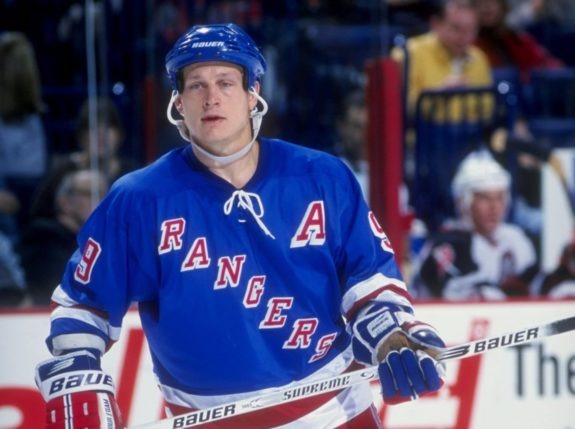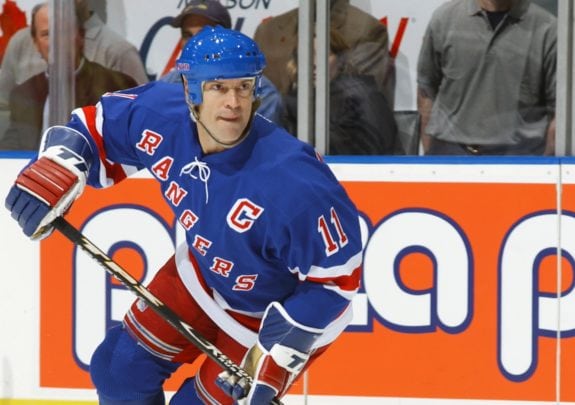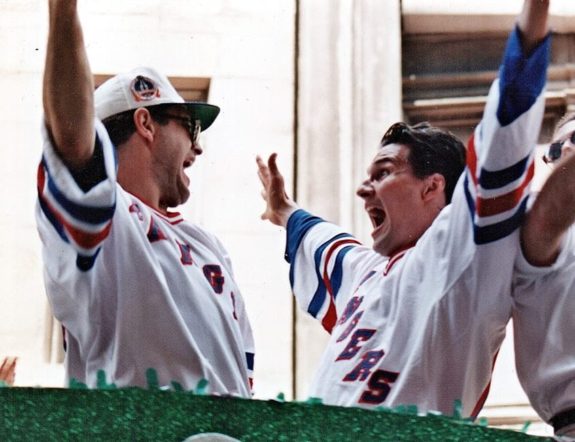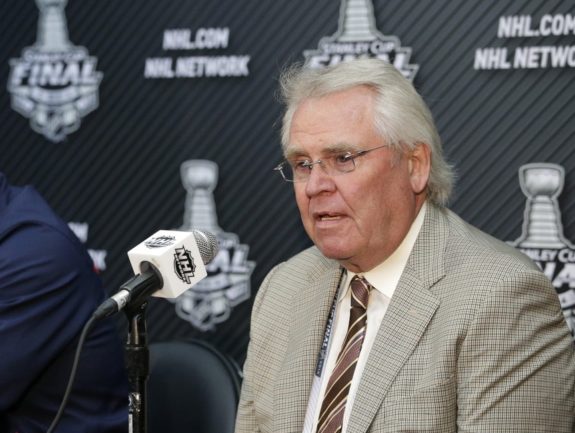Adam Graves is one of the most popular players to don the famous colors of the New York Rangers. The left winger played for the Blueshirts for ten years, skating in 840 games and scoring 308 goals.
In 1994, Graves played a major role in the Rangers’ Stanley Cup triumph. Despite his starring role, he always had a team-first attitude: “I was never about anything fancy. Mine was a very simple game. Go to the net, win one-on-one battles. My goals were never the most pretty,” he said in an interview in 2009.

It’s been 30 years since Graves first won the Stanley Cup with the Edmonton Oilers, but now is as good a time as any to look at his storied career.
A Perfect Fit for the Rangers
Born on April 12, 1968, in Tecumseh, Ontario, Graves was drafted by the Detroit Red Wings in the second round (22nd overall) of the 1986 NHL Entry Draft. He never made his mark with the Red Wings and was traded to the Oilers in a six-player deal in November 1989.
Related: New York Rangers and 99 – When Gretzky Hung ‘Em Up
Six months later, he celebrated his first Stanley Cup (and the Oilers’ last one to date). His second season with the Oilers wasn’t great but the Rangers recognized his talent. Graves signed with the Rangers as a free agent on Sept. 3, 1991.
It was a match made in heaven. The 23-year-old scored 26 goals and 59 points in his first season with the Rangers and the team won the Presidents’ Trophy. “Gravy” was voted the Players’ Player by his teammates.
He continued to improve the next season. On Nov. 25, 1992, he had the only five-point night of his career in a road game against the Pittsburgh Penguins. He tallied 36 goals and 65 points that season, but the best was yet to come.
Rangers Franchise Record: Graves Scores 52 Goals
Graves started scoring goals more consistently in 1993-94. Goalless streaks were short. On most nights, he scored a goal or two — his only hat trick of the season came on Feb. 2, 1994 in a rivalry game against the New York Islanders.
His season total was 52 goals — a franchise record. He broke Vic Hadfield’s mark of 50 goals set 22 years earlier. Graves’ dominance was staggering. Mike Gartner was the Rangers’ second-best goal-scorer with 28 (Pavel Bure of the Vancouver Canucks was the NHL’s goal king with 60 tallies).
“I vividly remember how supportive my teammates were of me, and how much they wanted me to break the record,” Graves said in 2009. “Mark Messier was the greatest example of that. He elevated his game to help other players — like me — to key moments. He took more pleasure in helping someone else have a great experience than he did in his own accomplishments.”

Graves’ record lasted 12 years. In 2005-06, Jaromir Jagr set a new franchise high with 54 goals. Graves, Jagr, and Hadfield are the only players to score 50 goals for the Rangers in a season.
Graves Scores 10 Goals During the Rangers’ Stanley Cup Run
Coached by Mike Keenan, the Rangers started the 1994 Stanley Cup Playoffs by thrashing the Islanders, allowing just three goals in a four-game sweep. The Washington Capitals were a bit tougher in the Eastern Conference Semifinals. The Rangers took the series, 4-1.
May 15, 1994 marked the start of a memorable series against the New Jersey Devils. (from ‘Memories of a 1994 Classic,’ New York Times, 05/11/2012) The Rangers won Game 7, 2-1, in one of the three double-overtime games of the Eastern Conference Final.
Related: Mark Messier – NHL Legend and 6-Time Stanley Cup Winner
Goal machine Bure and the Canucks were the Rangers’ opponents in the Stanley Cup Final. The Rangers defeated the Canucks, 3-2, in Game 7 at Madison Square Garden on June 14, to become the franchise’s first Stanley Cup champions since 1940.
In the playoffs, Graves scored 10 goals and 17 points — including the primary assist on Messier’s Cup-winning goal.
In a way, the Rangers’ Cup win was a second coming of the Oilers dynasty (1984-90). Seven of the 1990 Oilers champions hoisted the Cup in 1994 — in addition to Graves, the group included Messier, Craig MacTavish, Glenn Anderson, Kevin Lowe, Jeff Beukeboom, and playoff player par excellence, Esa Tikkanen.
“Coach Keenan had lost to the Oilers so many times (twice in the Stanley Cup Final) that he knew who he needed to win,” Tikkanen told me in 2019. “Messier was the born leader but there were other players with leadership skills, like Ed Olczyk. If it wasn’t for great team spirit, we wouldn’t have won the Cup.”

Rangers defenseman Brian Leetch was awarded the 1994 Conn Smythe Trophy but Graves became the seventh winner of the King Clancy Memorial Trophy that season as the player “who best exemplifies leadership qualities on and off the ice and who has made a significant humanitarian contribution to his community.”
Rangers Trade Graves After Tragedy
The Rangers qualified for the playoffs in the following three seasons. The lean years started in 1997 when the Blueshirts missed the playoffs seven seasons in a row.
The 1998-99 season, however, was another highlight. Graves was in a league of his own and scored 38 goals with the Rangers that season. Another iconic forward, John MacLean — who had arrived from local rivals, the Devils — came second with 28.
In 2000, Graves lost his newborn baby in February and his father in June. Understandably, such tragedies showed in his stats the following season — just ten goals and 26 points in the regular season. In June 2001, the Rangers dealt Graves to the San Jose Sharks for Mikael Samuelsson and Christian Gosselin.
Rangers general manager Glen Sather admitted that all good things must end. “He was going through a pretty tragic period in his life. Both he and the Rangers need a change. And I say that knowing it will be a long time before anyone will give back what he did. He is a unique guy,” Sather told the New York Post (from “Rangers Deal Graves to Sharks”, New York Post — 2001/06/25).

Graves played two full seasons with the Sharks before he retired in 2003 after 1,152 NHL games and 125 contests in the Stanley Cup Playoffs.
Graves: Heart of a Ranger
Graves’ tenure with the Rangers spanned from 1991 to 2001. In that time, he played 772 regular-season games with 280 goals and 68 postseason contests with 28 goals. He ranks third in goals and first in playoff power-play goals in Rangers history.
The statistics tell a story, but his significance goes beyond numbers. On and off the ice, Graves was one of the true leaders, for whom the team’s interest always came first. He never hesitated to stand up for a teammate — his 1,224 penalty minutes and numerous fights provide evidence of that.
Related: Oilers History – The Importance of Jimmy Carson
He was (and still is) a favorite among fans and players alike. He was voted Rangers MVP twice and Players’ Player four times. In addition to the King Clancy Trophy, he was awarded the NHL Foundation Player Award (2000) and Bill Masterton Memorial Trophy (2001). In 2005, he rejoined the Rangers organization and nowadays works for the club’s Hockey and Business Operations.
His No. 9 was retired by the Rangers in 2009. In the ceremony at the Garden, Messier emphasized Graves’ role as a player and as a person. “He always gave of himself to charities and to children,” Messier said. “He wasn’t doing it for recognition. Winning the Stanley Cup does not make you a champion. Adam is a champion because he lives his life with respect, honor, and compassion.”